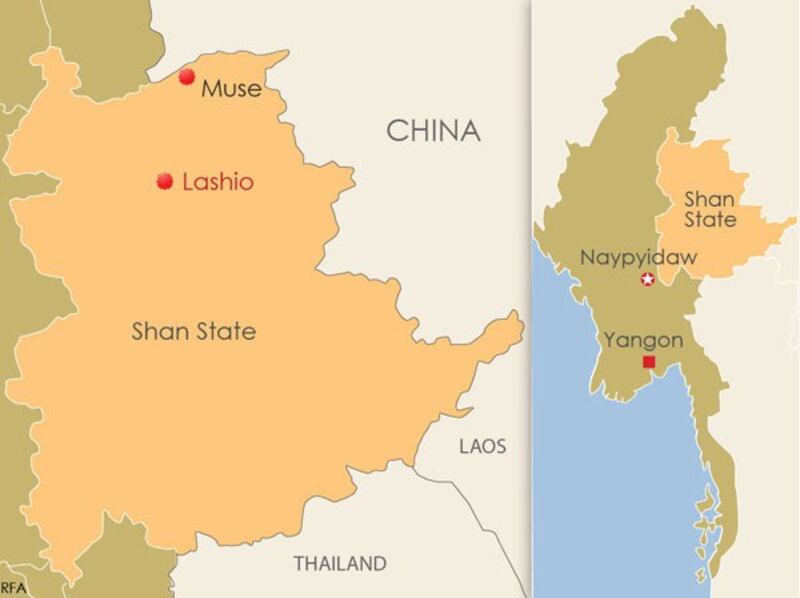Houses and mosques were razed by mobs in eastern Myanmar’s Shan state after a Muslim man allegedly set a Buddhist woman on fire, authorities said Tuesday, in the latest round of communal violence to hit the racially-charged country.
Sources told RFA’s Burmese Service that soldiers had been deployed to enforce an emergency curfew in the state capital Lashio after authorities dispersed the mobs which had set at least five shops, several houses and a mosque ablaze near a local night market.
They said the government had invoked Section 144 of the Constitution to provide the local authorities with emergency powers to bring the situation under control.
The sources also said that phone lines were down in Lashio, located around 200 kilometers (120 miles) from both the Myanmar city of Mandalay and from the Chinese border town of Muse, making communication difficult.
A police officer in Lashio, who spoke on condition of anonymity, said an ethnic Shan-Muslim man had been arrested after he “torched” a woman gasoline seller, according to Agence France-Presse.
AFP confirmed the arrest of the Muslim man with a local town official, who also declined to be named. The official said the man had “torched a woman with petrol.”
The Shan-Buddhist woman was brought to a local hospital for treatment, but neither official could give details of her condition.
The town official said that angry mobs, which included Buddhist monks, had “destroyed some houses and mosques,” without providing further details.
AFP quoted residents of Lashio who said that Muslim shops and a school had been set alight as Buddhist mobs demanded authorities hand the suspect over to them.
Hajji Aung Lwin, a Muslim man from the outskirts of Lashio, told Reuters that a group of people had tried to set fire to Myoma Mosque, near the Lashio market.

Communal violence
The Shan, who are mostly Buddhist, comprise the second largest ethnic group in Myanmar—around 9 percent of the nation’s 60 million people.
Violence between Myanmar’s Buddhist majority and the country’s Muslim minority, which accounts for some 4 percent of the population, is threatening to derail reformist President Thein Sein’s plans for national reconciliation and democracy following nearly five decades of military rule.
The latest clashes in eastern Myanmar were the fourth bout of sectarian violence in the country since last year, when deadly violence flared up in Rakhine state in the west.
The June 2012 unrest in Rakhine state followed by clashes in October left at least 192 dead and 140,000 homeless—most of them Muslim Rohingya, who rights groups say bore the brunt of the violence.
In March, clashes stemming from a quarrel between a Buddhist couple and the Muslim owner of a goldsmith shop in central Myanmar’s Meikhtila spread to other towns in the region and raged for more than a week, leaving at least 44 dead and 12,000 displaced—most of them Muslims.
Three Muslims, including the gold shop owner, were jailed for 14 years in April for assault, while this month seven more received sentences of up to 28 years in connection with the violence.
A township court in the Rakhine capital Sittwe earlier this month sentenced 10 Buddhist defendants to terms ranging from nine months’ to three years’ imprisonment at hard labor on charges of theft and destruction of property committed during clashes there.
Thein Sein this month vowed to uphold Rohingya rights, while opposition leader Aung San Suu Kyi on Monday spoke out in condemnation of a ban on Rohingya having more than two children in Rakhine.
Reported by RFA’s Myanmar Service. Translated by Win Naing. Written in English by Joshua Lipes.
